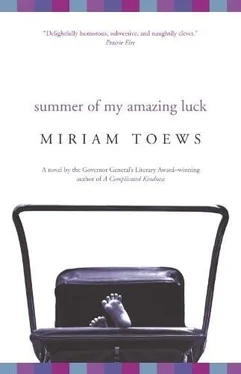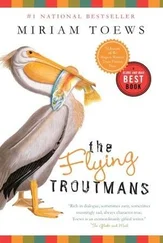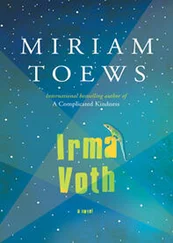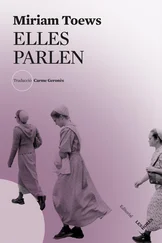Lish and Angela and Hart and Teresa and Dill and me sat in the kitchen quietly, drinking coffee, making sure we didn’t leave a mess, sometimes getting up and walking over to the balcony to watch the girls, who had become bored with the whole thing by this time and were playing in the parking lot in the sunshine. We were in shock. Mercy having a baby was the last thing we thought would happen at Half-a-Life. And why hadn’t she told us? We could have helped our. Then again, it would be a great feeling of accomplishment to have kept a secret for that long, nine months, or actually, eight, in a place like Half-a-Life. Finally Teresa said it: “So does anybody know who the father is?” and all of us just kind of gawked at each other and shook our heads and, naturally, wondered.
It was kind of a sacred time, the actual birth and everything, so none of us, even Lish, made any cracks about who it might be, though we were thinking about it, and later on, maybe in a day or two, we’d be trying to find out and coming up with our own ridiculous scenarios. Birth is a special thing, but in Half-a-Life we all start our nosing around very shortly afterwards. Not only us, but the dole, too. In the lives of the kids of Half-a-Life there were only a few days of freedom, of possibility; of what-ifs, before the dole swept in and took snapshots, fingerprinted, and filed all available data on the origins and future of this child, case number whatever it was. And all the questioning started.
While the other women talked about their own birth stories and revelled in the special conspiratorial mood of the occasion and Hart played with Dill, I sat on Mercy’s kitchen chair trying to sort things out. My mother’s death, Mercy’s baby, Gotcha’s fake death, Dill’s unknown father, my own father, who right now was helping to deliver the baby of a perfect stranger. He had never even seen Dill until tonight, his own grandson, and now suddenly he was Geoffrey Van Alstyne, midwife to the poor. I got up and walked over to the bathroom door. I listened to my dad saying over and over, slowly, in a soft voice filled with confidence, “Very good, very good, very good.” I sat down on the floor in the hallway and listened to him coax the new life out of Mercy, a woman he had never met until then. At the end of the hall I saw Lish move towards the fridge and stop for a second, on the way, to make a shadow puppet with her hand in the square of sunlight on Mercy’s wall. I could see Hart, awkwardly pretending to chew Dill’s toes off, and I saw Dill’s big wet mouth open, chuckling. If my mother had been in this apartment, she would have reflected happiness. If my mother was a mirror, like she said, I would have seen myself smile. And if my mother had been there she would have seen my life, and she and my dad would have spoken the words together, “Very good, very good, very good.”
Mercy had a girl. The father turned out to be the same father her other daughter had. We were all a little taken aback by that: in Half-a-Life it’s sort of assumed that siblings have different fathers. Mercy could control just about everything around her and keep everything in order, in nice, straight, clean lines. Except for her feelings about this guy. The Father. Most of the time she could keep him out of her mind and out of her apartment, but not always. And so, she had another baby. There are worse things that could happen. Since working for the Disaster Board, Mercy had a new life philosophy: to name what you fear, to look it in the eye and embrace it. And so she named her new daughter Mayhem.
You might think that my dad and me caught up on the years we had lost or talked about my mom or declared our love for one another. Wrong. After Mayhem’s birth, he and I and Dill went back to my apartment. He sat at my little kitchen table and drank a diet Coke with ice and gave Dill a present. It was a microscope. He hoped Dill could use it when he was older. We talked about the rain, his wrecked basement, not much else. But there we were.
That night Teresa had a tequila Scrabble party. It was only going to be a Scrabble party, but then after adding up all the positive things that had happened, she decided it had better be a tequila parry, too. Even Sing Dylan was celebrating, though not with tequila. Hart had managed to convince the women in Serenity Place not to sue Sing Dylan for flooding their basements. He told them that it would take months to get money for that but they could get money right away from the Disaster Board if they said their basements flooded naturally like everyone else’s. Welfare mothers all understood the appeal of quick cash, and we rarely let convictions stand in our way of getting it. So Sing Dylan wasn’t going to have to go back to wherever the hell he came from after all. Which was good. He had even managed, finally, to wash off every last trace of the graffiti on the North wall.
What was bad was the new graffiti. The morning after Mayhem was born, Lish and I looked out of her kitchen window and saw Sing Dylan back at his wall with his pail and his hose. Nobody could miss those big fresh yellow letters: EAT THE POOR THERE MORE TENDER. Lish really liked the sound of that, despite the spelling. Again. She said it was like a welcome sign to Half-a-Life.
Another thing we were celebrating was the success of Mercy’s blackmail campaign. Bunnie Hutchison met with Mercy in person, secretly, and guaranteed that the child tax credit would be brought back, if she didn’t breathe a word about Bunnie’s bogus flood claim. An extra thousand bucks? When you’re only pulling in nine grand, an extra thousand bucks in worth a little blackmail.
Unfortunately, Bunnie Hutchison has decided to set up what she called a Snitch Line to catch welfare cheaters. People are supposed to call some number if they know someone guilty of welfare fraud. So now Half-a-Life and Serenity Place, we’re all battening down our hatches and gathering our ammo, ’cause there’s sure to be a war. Again. Don’t even ask me how Lish reacted to news of the Snitch Line. The Snitch Line, the Fingerprints, the Surprise Home Visits, geez, you’d think we were dishonest. Which brings me to Lish and the Gotcha problem.
I was troubled by Lish’s unchanging mood. The whole point of that stupid exercise had been to resolve things for her, to stop the wondering and the waiting, to cement his love for her, to create a dead father for the twins to love instead of a missing one. About one day after I’d done it, I realized I had done the wrong thing. But still, Lish didn’t know the truth and, in my mind, she should have been acting differently. Based on what she thought she knew. Instead she was pretty much the same. She burned her incense, played her music, read her books, cooked her garlic dishes, hung out with her kids, helped Mercy with her baby, made cracks about everything, railed against the system. Nothing had changed!
As for my dad, well, he asked me if it would be alright with me if he stayed for three days while he had his basement cleaned out, installed a back-up valve and a sump pump, and replaced his weeping tile. With the ground as saturated as it was, there’d likely be more flooding next spring when it thawed. My dad decided to forget about having a finished basement and just live on the main floor. Dill and I didn’t really see a lot of him during those three days. The first night I let him sleep in my bed, and Dill and I slept on Lish’s air mattresses. The second night he said he would sleep on the air mattresses and when I said no no , he said, “I honestly would prefer to.” In the morning we drank coffee together and watched Dill perform feats of derring-do, as my dad put it. I hadn’t, up until then, really had anybody else to enjoy Dill with. And it was a wonderful feeling. I mean I had Lish and the other women in Half-a-Life, but my dad was far more thrilled with the little things Dill did. He saw them as incredible achievements. I think he was even proud.
Читать дальше












